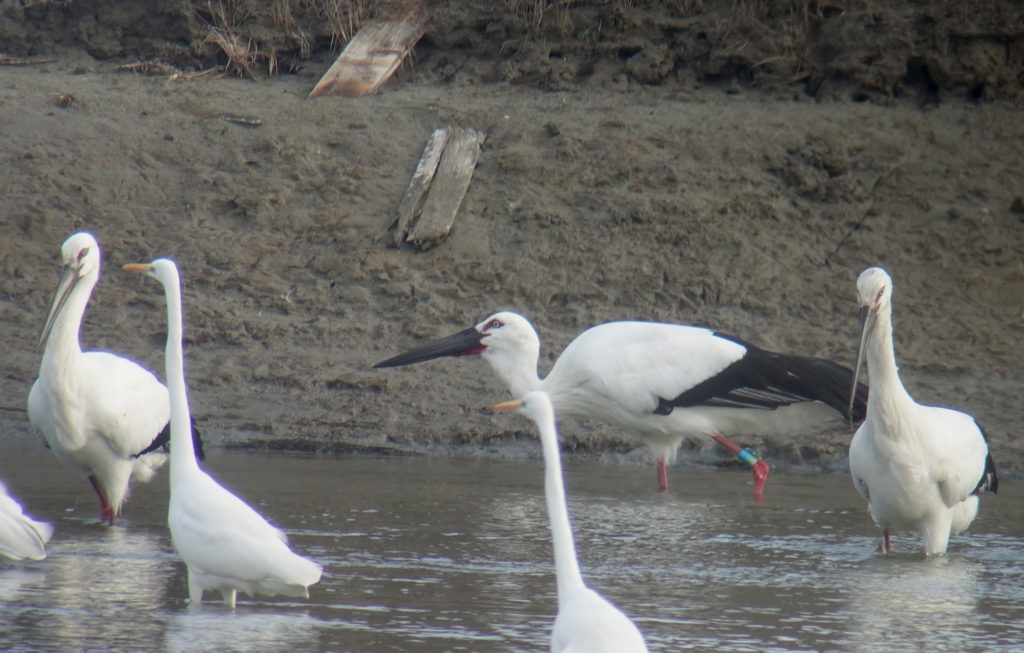Bird News from Nial Moores with Dr Paul Prevett, Candy McManiman and Mike Friel
Major highlights of the second part of this Anatidae and crane-focussed visit included close encounters with Oriental Stork and Red-crowned Crane, and decent views of Swan Goose and Steller’s Sea Eagle.
On the 9th at Gomso Bay there was yet more construction – but excellent compensation was provided by close looks at eight Oriental Stork (four of which sported jewelry from the various reintroduction programs in Japan and the ROK) mixed-in with a jostling crowd of towering Western Great Egret and nearby also one Black-faced Spoonbill in among a flock of 51 Eurasians. Also of note there was a single Dusky Warbler and several small flocks of Chinese Penduline Tit spiraling up and migrating southward. In the afternoon, we visited Paju, seeing a First calendar-year Steller’s Sea Eagle from the highway and enjoying prolonged looks at more flocks of Tundra Bean and Greater White-fronted Geese again in perfect light (but still failing to find any Lessers).

 Oriental Storks Ciconia boyciana with Western Great Egret Ardea alba alba © Nial Moores
Oriental Storks Ciconia boyciana with Western Great Egret Ardea alba alba © Nial Moores
On the 10th in Cheorwon, a colder day (with a morning low of -10C) started with excellent views of 400 White-naped and 25 Red-crowned Cranes standing on ice, with one family of the latter species soon after being chased playfully by a Korean Water Deer for several minutes.

 White-naped Cranes Grus vipio © Mike Friel
White-naped Cranes Grus vipio © Mike Friel
 Red-crowned Crane Grus japonensis © Mike Friel, some with legs tucked up because of the cold!
Red-crowned Crane Grus japonensis © Mike Friel, some with legs tucked up because of the cold!
 Red-crowned Crane family being chased by a Korean Water Deer Hydropotes inermis argyropus © Mike Friel
Red-crowned Crane family being chased by a Korean Water Deer Hydropotes inermis argyropus © Mike Friel
Although landbirds were rather scarce, we nonethless found half-a-dozen Siberian Accentor and several hundred Rustic Bunting, with best a single Pine Bunting (NM only).
Thanks to the very kind help of Dr Jiseok Jung, we were then able to access the CCZ, where we found a single Chinese Grey Shrike, a family of five Tundra Swan resting in a rice-field, and several hundred more Red-crowned and White-naped Cranes. In quieter areas the birds were easily audible over the embarrassing and loud propaganda broadcasts of K-pop and marching band music.
 Tundra Swan Cygnus columbianus © Nial Moores
Tundra Swan Cygnus columbianus © Nial Moores
 Red-crowned and White-naped Cranes © Nial Moores
Red-crowned and White-naped Cranes © Nial Moores
Sadly, there was no sign of any other crane species there, though one Siberian has recently been reported a little further east in the CCZ. The day instead ended watching c. 20,000 Greater White-fronted Goose (as estimated by Dr Lee Kisup) arrive spectacularly for roost on the Tokyo Reservoir.
On the 11th, we visited a couple of stretches of the Han River before spending a couple of hours at Namhanseong, where best was a close-feeding White-backed Woodpecker. Thanks to information from Dr Lee Kisup and members of the Waterbird Network we were able to locate a flock of Swan Goose (seeing 55+ out of the 63 still present) as well as re-find the Steller’s Sea Eagle glimpsed from the car on the 9th. Later, we also had rather better looks of a Steller’s at the usual wintering site, where additional highlights were a half-dozen Mandarin Duck and an unexpected mammal sighting: apparently a Large Mole Mogera robusta.
 Mandarin Duck Aix galericulata © Nial Moores
Mandarin Duck Aix galericulata © Nial Moores
 Large Mole Mogera robusta (?) © Mike Friel
Large Mole Mogera robusta (?) © Mike Friel

